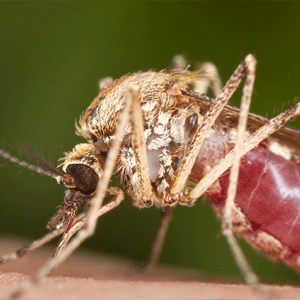
Chancellor George Osborne and Gates announced £3 billion (R70 billion) in funding over the next five years for research and to support efforts to eliminate the mosquito-borne disease, in a joint article in The Times.
Significant progress
"When it comes to human tragedy, no creature comes close to the devastation caused by the mosquito," the two wrote.
"We both believe that a malaria-free world has to be one of the highest global health priorities."
The fund would be made up of £500 million a year from Britain's overseas aid budget for the next five years, as well as $200 million this year from The Gates Foundation, with more donations to follow.
Read: 7 things worth knowing about mosquitoes
There were 438,000 malaria deaths in 2015, most of them of children aged under five, and the majority of them in Africa, according to the World Health Organisation.
Efforts to control the disease have made significant progress in the last 15 years, but are threatened by the spread of resistance to antimalarial drugs and to insecticide, the WHO said in its World Malaria Report 2015.
"If new insecticides are not introduced by 2020, the situation will become critical and deaths could surge," Osborne and Gates wrote, adding that fighting diseases required collaboration between private companies, governments and charities.
"We are optimistic that in our lifetimes we can eradicate malaria and other deadly tropical diseases, and confront emerging threats, making the world a safer place for all," the article concluded.
Read: Malaria – one mosquito bite can kill you
Vaccine trials
Microsoft co-founder Gates has turned his attention from software to fighting disease and other ills around the world with his wife, under the auspices of the Bill and Melinda Gates Foundation.
The charity has disbursed more than $28 billion and provided funding for the world's most clinically advanced malaria vaccine, Mosquirix developed by GlaxoSmithKline.
Mosquirix, or RTS,S, is the first malaria vaccine to reach Phase III clinical testing the final stage before market approval and the first to be assessed by regulators. It received a nod from European regulators in July.
A WHO expert panel in October recommended pilot roll-outs of the vaccine to young children in several areas of sub-Saharan Africa, before considering wider use.
See: Interactive malaria map for South Africa
The WHO is expected to follow the panel's recommendations, which could result in Mosquirix becoming the first licensed vaccine against a parasitic disease. But a decision still lies a way off.
In April last year, the results of a years-long trial with 15,500 children in seven African countries were published in The Lancet medical journal announcing mixed success.
Only around a third of the children who received the vaccine were protected for the full duration of the trial, researchers found.
But even so, the vaccine has the potential to prevent millions of cases and could save thousands of lives.
The new announcement comes days after the philanthropist Gates revealed plans for a $100 million scheme to cut malnutrition in Nigeria.
Read more:
Limpopo reports rash of malaria cases
Slower-than-average malaria declines in Africa
Swaziland likely to be first to eliminate malaria in southern Africa
Image: Up close a mosquito sucking blood from iStock




 Publications
Publications
 Partners
Partners















